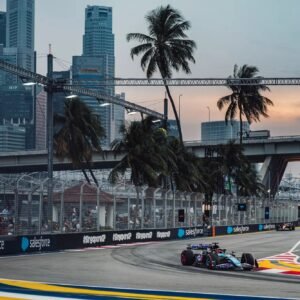The Indy 500, one of the most prestigious and legendary motorsport events in the world, has captivated audiences for over a century. Known as “The Greatest Spectacle in Racing,” this iconic race showcases the speed, skill, and precision of drivers and teams who compete for victory on the legendary Indianapolis Motor Speedway (IMS) track. In this article, we’ll explore the rich history of the Indy 500, its influence on racing culture, and the role of the IndyCar series in shaping this spectacular event.
This article was written by the team at Watancar Motors Store, offering an in-depth look at the thrilling Indy 500, the world’s greatest racing spectacle and its exciting history.
the Indy 500: A Racing Legacy
The Indy 500 is a cornerstone of motorsport, attracting millions of fans from across the globe. Held annually at the Indianapolis Motor Speedway in Indianapolis, Indiana, the race has become a symbol of speed, innovation, and fierce competition. Since its inception in 1911, the Indy 500 has remained a highly anticipated event in the racing calendar, earning its title as the “Greatest Spectacle in Racing.” This article dives into the significance of the Indy 500, its history, and its impact on the world of motorsports.
The Indy 500: The Greatest Racing Spectacle in the World
The Indy 500, also known as the “Indianapolis 500,” stands as the pinnacle of American open-wheel racing. Held each year on Memorial Day weekend, the race attracts the best drivers from around the world to compete on the legendary 2.5-mile oval track. The event is part of the larger IndyCar series, which features cutting-edge cars capable of reaching speeds over 230 mph. The race is not only about speed but also strategy, as drivers must navigate 200 laps while dealing with tire wear, pit stops, and changing weather conditions.
What Makes the Indy 500 Unique?
The Indy 500 is known for its tradition and culture, making it a racing spectacle unlike any other. The event blends high-speed action with a sense of community and history. With a rich legacy that spans more than a century, the Indy 500 is more than just a race—it’s an experience. The crowd of over 300,000 spectators, the signature “back home again in Indiana” song, and the unique qualifications process for drivers all contribute to the event’s mystique.
The Indianapolis Motor Speedway: Home to Racing Legends
Indianapolis is synonymous with racing, and at the heart of it is the Indianapolis Motor Speedway. This iconic venue has hosted the Indy 500 since 1911 and is regarded as the “Racing Capital of the World.” The track’s unique design, with its 2.5-mile oval and four distinct turns, has proven to be a challenging circuit for drivers. The Indianapolis Motor Speedway’s historical significance cannot be overstated—it’s where legends like A.J. Foyt, Mario Andretti, and Rick Mears made their names in motorsport.
IndyCar: The Engine Behind the Indy 500
IndyCar is the open-wheel racing series that forms the backbone of the Indy 500. This racing series features some of the most talented drivers in the world, competing in a variety of races, with the Indy 500 being the crown jewel. IndyCar cars are designed for high-speed performance and can reach speeds of over 230 mph on the Indianapolis Motor Speedway. The technology used in IndyCar racing pushes the boundaries of automotive engineering and aerodynamics.
Racing Spectacle: The Thrill of the Indy 500
The Indy 500 is a racing spectacle that captivates both fans and drivers alike. From the moment the green flag drops, the intensity of the race builds as drivers jostle for position, maneuvering at breakneck speeds while maintaining perfect control. The high stakes of the race, combined with the immense pressure of competing in front of a live audience, creates a level of excitement that few other motorsports events can match.
The Tradition of the Indy 500: History and Heritage
The Indy 500 is not just about speed; it’s about tradition. From the very first race in 1911, the event has been steeped in history. The race’s traditions include the iconic “winner’s milk” celebration, the singing of “Back Home Again in Indiana,” and the legendary “500 Festival Parade.” These timeless customs contribute to the unique charm of the Indy , making it more than just a race—it’s an annual celebration of motorsport and American culture.
Indy 500 Winners: Legendary Drivers and Their Triumphs
Over the years, the Indy has seen some of the greatest drivers in the world claim victory. Names like A.J. Foyt, Al Unser, and Rick Mears have etched their names in history as multiple-time winners. Each victory in the Indy is a moment of glory, as drivers demonstrate their exceptional skill and determination to conquer the challenging 2.5-mile track.
The Evolution of IndyCar Technology
One of the most fascinating aspects of the Indy and IndyCar racing is the constant evolution of technology. Over the years, advancements in aerodynamics, engine design, and safety features have transformed the cars. Innovations such as hybrid powertrains, advanced telemetry, and improved tire technology have helped push the performance limits of the cars, making the race faster, safer, and more thrilling than ever before.

The Indy 500 and Global Racing: A Worldwide Phenomenon
The Indy 500 isn’t just an American event—it’s a global phenomenon. Drivers from around the world compete in the race, and international audiences tune in to witness the action. The race’s global appeal has helped IndyCar build a strong following outside of the United States, with fans from countries like Brazil, Japan, and the United Kingdom watching the race and cheering on their favorite drivers.
Frequently Asked Questions About the Indy 500
Is IndyCar faster than F1?
While both IndyCar and Formula 1 (F1) are open-wheel racing series, IndyCars are generally faster on oval tracks like the Indianapolis Motor Speedway due to their aerodynamic design. However, F1 cars are typically faster on road courses due to their superior handling and cornering abilities.
Why is it called IndyCar?
IndyCar is named after the iconic Indy 500 race held at the Indianapolis Motor Speedway. The term “Indy” is derived from the location of the race and has become synonymous with American open-wheel racing.
Is IndyCar just American F1?
IndyCar is different from F1 in several ways. While both are open-wheel racing series, IndyCar focuses primarily on oval tracks, such as the Indianapolis Motor Speedway, whereas F1 primarily races on road courses. The car designs, engine specifications, and race formats also differ significantly between the two series.
Is IndyCar different from NASCAR?
Yes, IndyCar and NASCAR are two distinct racing series. While both are popular in the United States, IndyCar features open-wheel cars that race on a variety of tracks, including ovals and road courses. NASCAR, on the other hand, uses stock cars that primarily race on oval tracks.
Conclusion: The Indy 500 Legacy Lives On
The Indy 500 is more than just a race—it’s a celebration of speed, history, and innovation. As one of the most prestigious events in the world of motorsport, it continues to captivate audiences, inspire drivers, and shape the future of racing. The event’s rich traditions and its deep connection to the city of Indianapolis make it a true spectacle that will remain a cornerstone of racing for generations to come.
Discover the thrilling world of Formula 1 racing, its fast-paced action, legendary drivers, and iconic teams. Learn more about the excitement in our in-depth article on Formula 1!






